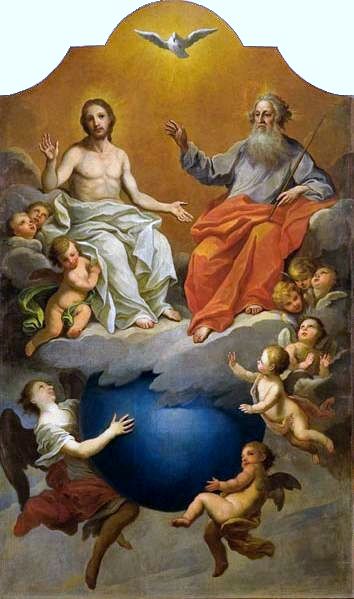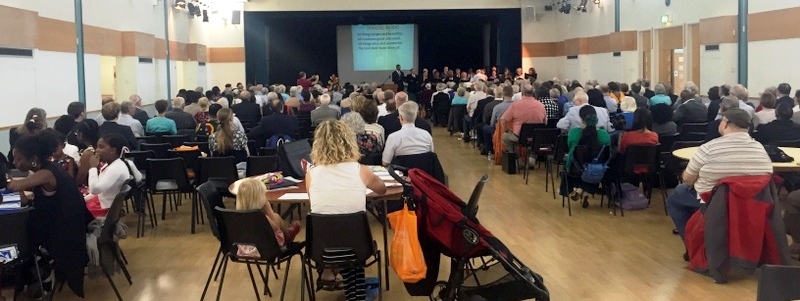Dear Brothers and Sisters,

In the late 1830s, American artist and inventor Samuel F. B. Morse perfected the electromagnetic telegraph. Then in 1844, using his new invention, Morse sent a telegram from Washington, D.C. to Baltimore, Maryland. Tapped out using what we now refer to as Morse code (which reduces words to dots and dashes), his message was quite short: What hath God wrought? (Old English for What has God done?) Morse’s now-famous question got me thinking about how God the Father, by sending his incarnate Son in the power of the Holy Spirit, both revealed to us who he is, and reconciled us to himself.
Revelation and Reconciliation is What God hath wrought.
The triune God in action

(public domain via Wikimedia Commons)
Our triune God is a God of action. From all eternity his being is that of doing. The Father, Son and Spirit were always in relationship—always interacting, always loving. As Jesus said, there was a knowing, loving and glorifying of each other before the foundations of creation were laid. There never was a time when God was lonely—he never was the solitary Unmoved Mover some have wrongly imagined. The Triune God is a living fellowship of holy love among the three divine Persons.
Accomplishing Revelation and Reconciliation
We know these things about God only because he acted towards his creation in such a way that we, his creatures, can know him. As Scripture declares and the early church taught, only God knows God and only God reveals God. God did not remain at a deistic distance expecting us to guess, instead he made a personal appearance, revealing himself to us in the person of the incarnate Son of God, Jesus Christ. Scripture also declares that humankind, having become alienated from God, is in need of reconciliation with God. We all need the regeneration of our beings that has been accomplished by the Father, through the incarnate Son, and by the Spirit.
To truly know God means to know both who he is and what he has done in relationship to us. Who God is in his being is revealed to us through God’s doing on our behalf. Unlike humans, whose being and doing are separated, and often in conflict, there is no separation, no conflict between what God does and who God is. As T.F. Torrance notes in Theology in Reconciliation, when we carefully and prayerfully take this truth into account, we will arrive at an “astounding conclusion”:
God has made possible, and actual in Jesus, a true human knowledge of himself, not just as God is toward us, but in some real measure as God knows himself, as Father, Son and Holy Spirit, from all eternity. (p. 238)
The triune God has brought about both Revelation and Reconciliation.
In and through the God-man Jesus Christ

at St Catherine’s Monastery, Sinai
(public domain via Wikimedia Commons)
Scripture tells us that the fullness of the Godhead dwelled in the human-born Jesus. The author of Hebrews put it this way: “The Son is the radiance of God’s glory and the exact representation of his being” (Hebrews 1:3). In and through his incarnate Son, Jesus Christ, and by the Spirit, God the Father has revealed to humanity who God is and what he has and is doing to bring humanity into right relationship with himself. Reconciled to God in Christ, we come to know not merely something about God, but who God actually is.
It’s only an analogy, but we might make a comparison between the coming of the Son of God to us in the person of Jesus with one of us going to a bunch of ants in order to have a relationship with them. While remaining who we are (human), we become one of them, dwelling within their anthill. We do this to be with them and to interact with them without losing our identity as a human.
In like manner, God the Father, through the Spirit, sent to us his Word in the person of Jesus to reveal himself to us, and in so doing to bring us his reconciling, saving grace. What the triune God has done reveals who he is—our Reconciling God!
The scientific theology of T.F. Torrance essentially says that the way of knowing God is the same as the way of salvation. Jesus is both the Truth of God (revelation) and the Way to God (reconciliation). Though God is not a part of his creation, nor is creation a part of God, God is not cut off from his creation. As Karl Barth noted, “God is not imprisoned in his transcendence.”
According to Torrance in The Mediation of Christ, God the Father, in Jesus, through the Spirit accomplishes both God’s self-revelation and his graceful gift of salvation-reconciliation:
Perhaps the most fundamental truth which we have to learn in the Christian Church, or rather relearn since we have suppressed it, is that the incarnation was the coming of God to save us in the heart of our fallen and depraved humanity, where humanity is at its wickedest in its enmity and violence against the reconciling love of God. That is to say, the incarnation is to be understood as the coming of God to take upon himself our fallen human nature, our actual human existence laden with sin and guilt, our humanity diseased in mind and soul in its estrangement or alienation from the Creator. This is a doctrine found everywhere in the early Church in the first five centuries, expressed again and again in the terms that the whole man had to be assumed by Christ if the whole man was to be saved, that the unassumed is unhealed, or that what God has not taken up in Christ is not saved. The sharp point of those formulations of this truth lay in the fact that it is the alienated mind of man that God had laid hold of in Jesus Christ in order to redeem it and effect reconciliation deep within the rational center of human being. (pp. 48-49)
Mission Developer Rod Matthews, who ministers for GCI throughout the South Pacific Region, told me about Bislama, a dialect of Pidgin English spoken in Vanuatu. In that dialect, Jesus, the Word of God, is called Tok blong God, literally translated talk belonging to God. No matter the language spoken, Jesus, for all humanity, is Tok blong God. To us, with us, and for us, Jesus is the Word from God—God-talk straight from the heart of God.
Dear sisters and brothers, Jesus is What God hath wrought.
Joseph Tkach
PS: Along with Greg and Susan Williams, and Gary and Cathy Deddo, Tammy and I recently visited England to participate in a ministerial conference (pictured below), and to celebrate the 60th anniversary of the founding of our London churches. Congratulations (and thanks) to all our members there!




Knowing about God and knowing God are two quite different matters. I have come to learn more about God through theology and other sorts of devotional literature. But knowing God directly has not been large in my life.
I used to live near a conservative evangelical, charismatic university in a large Midwestern town. I rode the bus to my job in the city center. Sometimes students from the university would be on the bus and I would hear their discussion. Some of them seemed to always be having miraculous events occur in their lives. God seemed to always be speaking to them directly. I felt a little left out. They seemed to have a rich relationship with God and I had a very spare one.
Over the years, I have come to realize that I know God only as much as he wants me to know him. There is no way to exceed that mark. I am at peace with this.